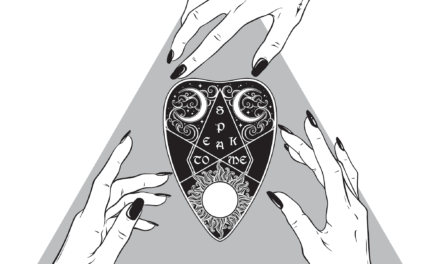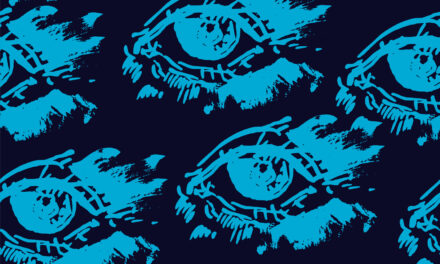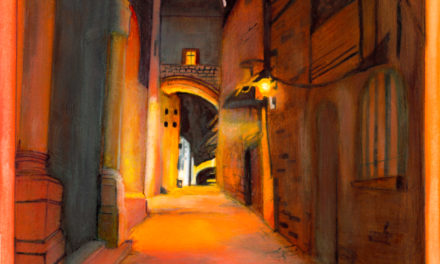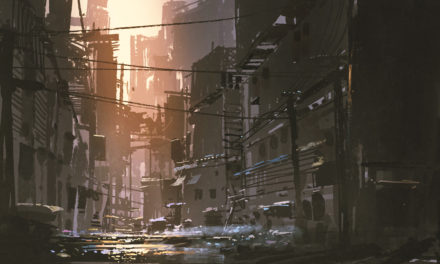The Flight of Grackles
by Joel Page
Issue 6: Industry | 1,923 words

©grandfailure
We tread worshipfully among the souls of the ancients on the last days that we shall have souls. Downtown, the buildings are manifestly sentient; they stand in noble block-like awareness, silently humming their locations to each other. The manifest sentience of buildings is a foundational soul—a very precious one to both of us—released at the city’s birth. We stood among it seven years ago when we revealed to each other the nature of our souls after they were to be discharged. Soon, this phenomenon will become invisible to us.
We ran, on that day, from the crooked building where you can, by machine, have your soul determined. That is to say, in that building, a machine can tell you what phenomenon your soul will become when it is eventually released into the city’s atmosphere. From the crooked building where souls are determined, we ran to meet each other on the sidewalk to catch the trains back home. We left home that day with the pretense that we would not tell each other what phenomenon our souls would become after they are released; there is a certain intimacy in the revelation. As the buildings hummed, we grinned and walked along the sidewalk, holding hands and laughing at our secret intentions to divulge the eventual shapes of our souls. When we noticed that we had walked far from the train station, and entirely in the opposite direction, she blurted out “wind,” and I blurted out “birds.”
We are impoverished now, twenty-five and twenty-four, and hungry. In a manner of days, it will be necessary for us to expel our souls to become employed, since labor in the city’s digital machinery is not compatible with the possession of a soul. You may keep your soul as long as you like, but most release the soul into the city, where it animates the city’s features to the delight of children and youth. I have seen a few graying privileged children walking outside, admiring the city’s features and writing poetry—sure signs that they have used family wealth to retain their souls into middle age. Neither of us, however, are so lucky. All members of either of our families have surrendered their souls to obtain employment.
My elder brother’s soul now animates the flow of buses and renders it as blood, a capillary wash of energy and civic nutrients throughout the city’s streets. My father’s soul is visible only at night, as the blinking lights of planes that exalt straight invisible lines through the empty black. The sister of my beloved has become the speech of antenna towers, which babble gently and incoherently in flashing lights and radio waves. Should I choose to expel my soul and seek employment, my soul will become the flight of urban grackles. They now move by formula in relatively straight lines across the city. If my soul is released, they will instead flock unaccountably in great curving arcs. They will by my soul acquire volume and fill the air between the streets, tracing the shapes of localized skylines in low aerial planes, blotting the sun, and surrounding the viewer. My love will lend her soul to the sound of the wind that wraps around our buildings, and so become the whistle of civilization. And the two of us will walk soullessly through and beneath all of this, in vacant oblivion to it.
There is another option: we can retain our souls and enter the monasteries or the abbeys—communities of simple manual labor and contemplation. This option, however, requires sexual purity and will not permit us to see each other again. It has, nonetheless, appeared increasingly attractive to me as the horror of soullessness approaches. It seems to me that if we choose this option, we might, at least by our souls, appreciate the beautiful tragedy of our separation.
The density of expelled souls is very high downtown, and it is consequently a very evocative environment. But it can become cacophonous, so on long walks, we often gravitate to parks and outer residential areas, where the souls animating the city’s features may be more peacefully appreciated. I hold my love’s hand as she leads me onto a bus to the city’s outskirts to view its skyline, which stands by some ancestral soul as the fearsome craggy teeth of the city. She points me to the slither of the commuter train, writhing on its tracks beside us. I reach around her waist as we sit enraptured by the train’s movement, until, at last, it disappears ahead of us. My hand rises to her hair, and I turn to her so that I am not distracted by the population of expelled souls visible in the city’s features outside my window. Her eyes burst in the darkness of the bus’s interior and I wonder briefly whether she might herself be animated by the expelled soul of another.
We exit the bus and walk a block upon a street whose slope is the soul of my math teacher. In the park, we sit beneath the ringing angles of downtown buildings, dazzling and motionless in the distant sky. She kneels next to me and considers, I think, whether I am likely to enter the monastery. She seems to decide that I am disposed against it and smiles to think that we will stay together. But she is wrong.
She asks me to marry her, and I tell her that I would gladly do so if I could keep my soul. “I’ve always known that,” she tells me, “but I’d like to stay with you, even after they take them away.”
“I can see no point,” I say, “in staying with you after our souls have been removed. If we are capable of love after we lose our souls, the love will be scarcely recognizable. I can’t help but think that to remain married without a soul is to mock the fact that we were once in love.”
She pulls me up to my knees. “It’s an act of poetry,” she says, “to love without a soul. Spending our lives together will be beautiful even if we can’t know it as such.”
I am not persuaded and shake my head. “I think I would rather feel sorrow than have you and not know what I have. We could write each other letters from the monasteries, know that we still love each other, and enjoy the sadness.”
I see loss in her eyes at this choice. “Do you not want your body to be with me?”
“I would do anything,” I say, “to keep my body with yours, but this would not be my body with you; it would just be a body. I would not be with you.” I expound on the point and reference the emptiness of her brother, now a year past the expulsion of his soul. He is a trudging shell. Each time we see him, he mechanically hugs us, wishing us well, but without any apparent appreciation of beauty, love, or tragedy. I ask her why she would turn me into such a being, why she would want to become such a being, and whether she wouldn’t prefer simply to weep for each other.
She shakes her head slowly, as if sensing something she cannot express. My hand reaches to her cheeks and is lost in the flow of her tears, which run into the space between my fingers. She gulps for air. I attempt to kiss the gulp away but cannot move my lips back apart from hers. I fall into lush grass with her, and we make love.
We are thus abruptly committed to the expulsion of our souls. It is possible, I suppose, to try to gain admission to the monasteries in spite of having made love. I do not know what manner of machines read you pure or impure at the monasteries, nor whether they might be deceived by some artifice. But whatever chance we have of accomplishing this must be discounted by the necessity of doing so twice, and by the practical difficulty of determining how to do it in a matter of days. In any case, it is her choice to expel her soul, and I would therefore have no beloved with whom to exchange letters were I to enter the monastery.
After making love, we lie within the park as dusk falls and stare at clouds that appear dark against the blue-black sky. They are the soul of no one, but beautiful nonetheless. She persuades me to marry her. It means a great deal to her, so I defer in spite of some ambivalence, and we return downtown to exchange vows amid the oceanic roar of the highway.
In the following days, we spend our dwindling strength making love and touring the mournful spirits of the city: the sparkling desolation of its parking lots, the brave decay of its wooden billboards, and the listless rustle of its most meaningless graffiti. On the second day, we suffer from grief and decide to seek an apartment, to remind ourselves that we will be together, and to seek relief in the ordinary.
On the third day after our marriage, I tell her falsely that I cannot make it through the day without eating and must find work. I suspect that I could go another couple of days, but am overwhelmed by fear at the skeletons of life we are to become, and wish to get it over with. She does not question me, but tells me she will wait another day to expel her own soul, as she wishes to see the skyline animated by a soul just one more time. She offers to take me to the hospital, and to hold my hand as my soul is released—a comfort that is permitted by the medical authorities, but one which no one will be left to perform for her.
The hospital is an antiseptic linoleum, and it is difficult to determine whether it is animated by an expelled soul or whether it is simply an expression of soullessness. I consider the possibility that it might somehow be both. I am called to the doctor’s office in less than an hour, and she sits next to me in the terrifying waiting period, reassuring me that we shall have a child together, that something with a soul shall thus be in our lives, and that it shall appreciate the beauty of the path we have chosen. This is, I suppose, of some comfort.
I sign surprisingly little paperwork to consent to the procedure; the doctor explains that no one without a soul has ever complained of its absence, a fact that is simultaneously comforting and ghastly. The doctor escorts us to another room with a series of black tubes attached to the hospital’s external wall. My love holds my hand; I prepare to become empty. A whirring begins from the wall, and I am rendered unconscious as my soul is sucked into the city sky.
••••
I awaken as the flight of grackles flocking unaccountably in great curving arcs, acquiring volume, filling the air between the streets, tracing the shapes of localized skylines in low aerial planes, blotting the sun, and surrounding the viewer. I cry into the air in several inconsistent tones as I pause on parking lots and sidewalks in terrifying multitude. Then I take flight again and rise above the pavement, waiting to dive around buildings on windy days and into the whistle of civilization.

Joel Page
Joel Page is a public defender in Dallas, where he writes appeals for federal prisoners. His fiction has appeared in Thimble Literary Magazine, The Fabulist, and Word Machine Magazine, and he is the fiction editor for the West Texas Literary Review.




